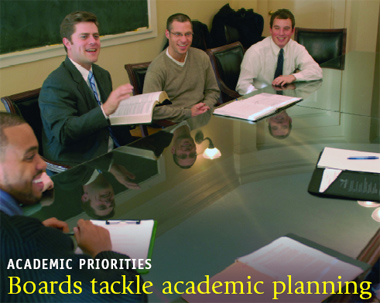 |
| Balancing academic and nonacademic preparation for ministry is the goal for most theological schools, like Covenant Theological Seminary. Sean Lucas, the seminary's chief academic officer (shown here with an open Bible), wants to ensure that the two facets of preparation blend well. |
Institutional planning is a quintessential task in governance. When a theological school's board, president, and faculty cooperate in determining how to achieve the school's educational mission, they are fulfilling their mandated responsibilities.
The institutional self-study required for reaccreditation reminds leaders in governance that their planning is also a matter of public accountability. This formal process, which usually takes place once every 10 years, creates a natural opportunity to review and renew an educational plan that recalls the school's purpose, sifts academic priorities, and points the way forward. In Trust talked to four schools that have recently done just that, especially to learn how the board was involved and what emerged.
Academic issues that arose from the process ranged from the most basic — getting and retaining students — to the more complex challenges of adapting to an increasingly online learning world.
Questions common to all the schools included "Who makes decisions about academic programs?" and "Where should we place more resources going forward?" Boards with a wide variety of structures communicated these priorities through retreats, strategic plan reviews, routine reports and sometimes simply dinner conversations.
Getting away to get people together
Retreats are a popular way for schools to get faculty and board members into dialogue -- and sometimes others from the administration or community as well.
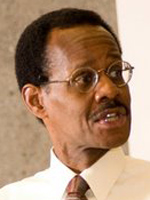 |
James Echols, president of the Lutheran School of Theology at Chicago, says that while faculty make most decisions about academic programs, the board offers input as well, bringing the perspective of the wider church to the discussion.
(LUTHERAN SCHOOL OF THEOLOGY AT CHICAGO) |
The Lutheran School of Theology at Chicago (LSTC) has used a retreat as a way to consider long-range plans. The school's board is 40 percent clergy and 60 percent lay, and chair David Wegge, in his 10th year on the board and second as chair, just went through his first reaccreditation process. "The communication between board and faculty is generally pretty positive," Wegge said, explaining that the board's academic committee meets with the dean, and the board regularly meets with faculty over dinner and other social occasions.
James Echols, president of LSTC, said the board is not deeply involved in crafting academic programs, but when a program is brought to them, they review it and raise questions. "The faculty carefully listens to the board perspective on what is going on in the church," Echols said.
At a board-faculty retreat a few years ago, a church official and a local pastor gave presentations to help shape the conversation. The seminary's board also incorporates denominational representatives from different regions to widen the perspective.
Knowing what's going on in the church at large and one's own denomination is vital to shaping academic programs and making decisions about future resources.
Many voices in the review process
At Carey Theological College in Vancouver, British Columbia, multiple voices are involved in the governance and program review process. Its two-tiered structure, with a board and a senate, was designed by the provincial legislature. The senate of about 22 people includes key stakeholders: faculty, board members, students, and representatives from other regional seminaries — Regent College and Taylor University College and Seminary.
Carey is on the campus of the University of British Columbia, but it is a freestanding institution with its own board, elected by its denomination, the Canadian Baptists of Western Canada.
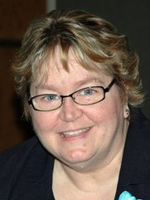 |
Board chair Fay Puddicombe says that Carey Theological College has a process in place to provide additional mentoring to students who are succeeding academically but seem otherwise unprepared for ministry. "Academics are not everything," she says.
(CAREY THEOLOGICAL COLLEGE COASTLINE STUDIOS) |
The senate hears course approvals and appoints a subcommittee for academic planning. Dr. Brian Stelck, in his 14th year as president at Carey, said that this makes for a very detailed, rigorous review, but it nevertheless runs smoothly.
With the senate evaluating the details of the curriculum, the board doesn't "get into the nitty-gritty of the academics," said Fay Puddicombe, the board chair, but "we're totally part of the team and quite transparent." There are board members on the senate, which aids communication.
"We're really flexible," she said. "It comes from having a good relationship with our faculty and our president."
Once all the stakeholders are together, especially after an intense self-study period like the one that comes with reaccreditation, programs are scrutinized and new questions and priorities emerge. Sometimes they reflect broad board concerns, like "What direction do we want to go?" And sometimes they are more detailed, focusing on a particular degree program.
Expanding education
The changes within theological education — toward more distance learning and online courses — are challenging many schools, as is the demand for lay education and nondegree programs.
Grand Rapids Theological Seminary is grappling with the extent to which it should invest in programs outside the traditional M.Div., including lay education. The school's academic dean, John F. VerBerkmoes, sometimes wonders if new programs are just good sense — planning strategically for future growth — or if they signal a loss of the school's focus. He acknowledges that theological schools sometimes do a less-than-stellar job of connecting to local congregations. And that means the board's input is needed if the seminary is to understand the needs of its constituents — the churches that receive and hire its graduates.
Like Grand Rapids, the Lutheran School of Theology at Chicago is working on expanding lay education and continuing education programs, while also increasing enrollment in its degree programs.
"We are at the beginning of a conversation about right-sizing our programs," President Echols said. That includes looking at the adequacy of financial aid resources as well as determining the optimal student body size. And it means asking questions like "What is the critical mass of students you need to have in a Ph.D. program?"
In St. Louis, Covenant Theological Seminary is also putting more resources into continuing education. "We don't think an M.Div. is enough to be sustained lifelong as a pastor," said Sean Lucas, who is chief academic officer of the Presbyterian Church in America-affiliated school. During the process of its accreditation self-study, Covenant gutted and revamped its doctor of ministry degree. The new program will be rolled out to the board at its April board meeting and should be on track to start in January 2009, Lucas said.
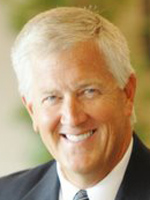 |
| Doug Fagerstrom, president of Grand Rapids Theological Seminary, says that his board allows him the freedom to act without putting him under the microscope, but he knows that when times are tougher, strong governance is all the more important. |
Meanwhile, in Canada, churches are hiring untrained or partially trained people and need them trained on the job, said Brian Stelck, president of Carey Theological College.
It's a challenge to deliver education to local congregations when one-fourth to one-third of Western Canadian Baptist clergy have less than a master's degree, Stelck said. "They're asking us to upgrade them." At the same time, western Canada is experiencing a net loss in clergy.
But all those working pastors can't leave their positions to attend Carey full-time, and often it doesn't even make financial sense. It costs a thousand Canadian dollars to fly from a central Canadian city like Winnipeg to Vancouver, Stelck said, while the courses cost $700. That means that Carey is committing to more investment in online courses, making the education available to those who need it — where they need it. Carey has purchased new hardware and software and is working on more video conferencing and online courses.
Stelck added that the difficulty in communicating with the board about this is often in the vocabulary of online technology, as the school makes decisions about things like whether to use live or delayed streaming video. Thus, as the school grows and makes changes, the board has to learn along with the faculty in order to assess new programs.
Getting the board involved in the first place
For Grand Rapids Theological Seminary, which has about 270 students and completed its 10-year accreditation about a year ago, involving the board in anything is an ongoing challenge. The seminary doesn't have its own board — or even its own committee on the board of Cornerstone University, of which it's a graduate program.
"Functioning within a university structure can be a complex, messy, and sometimes frustrating reality," said VerBerkmoes, who's been academic dean since 2002. The university board eliminated most of its committees a few years ago. "That has made it very difficult, as you might imagine, to have strategic face time with the board at large."
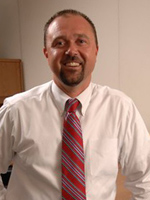 |
John F. VerBerkmoes, the academic dean at Grand Rapids Theological Seminary, recognizes that new academic programs may signal healthy planning for the future -- or they may indicate a loss of focus.
(COASTLINE STUDIOS) |
Without a committee on the board, the seminary's president has become the sole voice of the seminary at university board meetings. Doug Fagerstrom, in his fifth year as president of the seminary, generally offers a quick summary report and gets some questions from board members at meetings, he said.
At the same time, Fagerstrom said, the seminary has been enjoying healthy growth, and "morale is at an all-time high." He reports that the seminary is retaining students well and coming in on budget. Because of this good news, the board is allowing him the freedom to act without putting him under the microscope, Fagerstrom said.
Yet he realizes the time may come when things aren't so rosy — and then it will be even more important to have an open line of communication with the board. Among the shared governance questions they are now facing are "Who decides what?" and "How do we process decision making?" said Dean VerBerkmoes.
"We want to wrestle with governance," said VerBerkmoes. "We really need them involved in these more nuanced conversations." He said the seminary hopes to involve board members in assessing the outcomes of their programs.
To get everyone together and talking, Grand Rapids Theological Seminary has planned a retreat this autumn that will include faculty and two board members who are pastors. Daniel Aleshire, executive director of the Association of Theological Schools, is coming to lead a discussion on governance. One of the retreat's goals is to define the proper roles for the faculty and for the board in determining academic priorities.
Equipping to equip
It doesn't matter whether schools are going online, building new degree programs or working out strategic plans — the academic goals eventually come down to the students and the school's mission.
Wegge, chairman of board at the Lutheran School of Theology at Chicago, said that in order to complete a strategic plan, the board looks to the "defining marks" of the institution to assess its priorities. Those include being "global, multicultural, and ecumenical."
Covenant, on the other hand, is taking a heart-centered, holistic approach to retaining and training students. Lucas said because students who drop out tend to do so in the first 15 hours of their M.Div. programs, due to financial issues, Covenant is trying to help. They are planning to begin a program of mentoring for students making the transition to seminary.
As Covenant shapes its strategic plan, which will be finalized in April 2008, Lucas said one of the major goals is to blend the curriculum with the programs that supplement academic life.
Covenant is focusing on the heart, mind and leadership skills, he said; their motto is "equipping to equip." That means teaching students to see ministry as mentoring and discipling others, not just an academic pursuit. "We don't want to create brains on sticks," he said.
At Carey Theological College, students have faculty advisers who serve as mentors and look out for their development, said Puddicombe, the board chair. A process is in place to step up the mentoring in those cases in which a student is succeeding academically but just may not be ready for the ministry. "We haven't had that problem, but we have the process in place," Puddicombe said. "As a board, we don't know the students personally that way," but they rely on good communication from Carey's faculty.
"Academics are not everything when you're preparing people for ministry," she said.